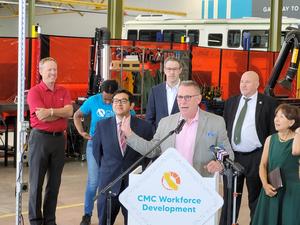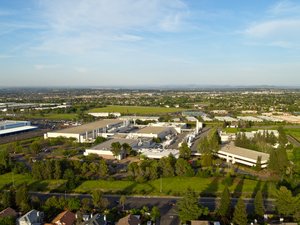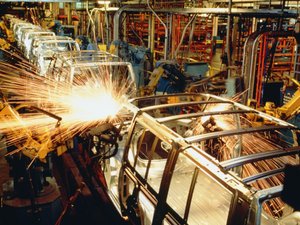The proposed $1.5 billion investment by Bosch into an aging Roseville chip plant may be just the start of a flow of investment into the Sacramento region as a result of the Creating Helpful Incentives to Produce Semiconductors and Science Act of 2022, also known as the CHIPS Act. The act is meant to increase manufacturing and research of semiconductors in the United States.
Sacramento Congresswoman Doris Matsui is rallying local groups to establish a Regional Technology and Innovation Hub in Sacramento at the California Mobility Center, which could also get CHIPS Act funding.
Even though it's just a small part of the CHIPS Act, the Tech Hub program stands to appropriate $500 million to establish 20 hubs across the country.
"I think it is going to be a game changer," Matsui told the Business Journal. "It can open the doors to many opportunities in Sacramento."
The deadline to apply for a hub is in August.
According to the CHIPS Act, a Tech Hub is a regional effort to commercialize, manufacture and deploy critical technologies for industries of the future. The program will invest in regions with existing assets, resources, capacity and potential to be globally competitive within a decade and to create jobs.
The program demands a local consortium that must include at least one of five categories: a university, a local government, industry groups or at least one company, economic development organizations and labor or workforce training groups.
The Mobility Center
The California Mobility Center was initiated in 2019 by the Sacramento Municipal Utility District, which made an initial $5 million investment and committed to up to another $10 million in matching funds. The current Mobility Center opened in 2020 in 25,000 square feet in Depot Park, a business park on Fruitridge Road in the Power Inn Road area. It is a prototyping lab for electric transportation and technology, and it has workforce training operations.
As a nonprofit focused on fostering technology and businesses for a zero-carbon transportation future, the California Mobility Center ties in nicely with the Tech Hub concept, Matsui said. The CMC isn't just focused on electric cars and trains. Its mission also includes the underlying technologies in power management, energy storage and even the silicon chips that make it all work.
Current members of the mobility center include carmakers, technology companies, utilities, electric grid operators, charging companies and a host of startups that access the center’s ramp-up factory.
From the start, the plan has been to develop a larger Mobility Center just south of California State University Sacramento as part of the planned 240-acre Sacramento Center for Innovation on Ramona Avenue.
Matsui said she is excited about the prospect of a Tech Hub at the Mobility Center, and is pushing to get the word out locally.
"The energy around this is wonderful to get people to want to be involved," she said, adding that it's vital to convene the right people and also to keep them motivated. "We have a lot of competition for this. We are not afraid of that."
The CHIPS Act so far
The primary goal of the CHIPS Act is to spur domestic chip manufacturing. It provides $52 billion in subsidies for domestic manufacturing, plus investment tax credits for the cost of manufacturing equipment.
More than 50 new domestic chip fabrication projects have been announced since the CHIPS Act was approved, with private companies pledging over $210 billion in investments, according to the Semiconductor Industry Association.
Stefan Hartung, the chairman of Bosch, said on Bloomberg Television that the German company is acquiring Roseville-based TSI Semiconductors' chip fabrication plant at 7501 Foothills Blvd. to quickly bring a new generation of silicon carbide chips to market. Bosch is also seeking CHIPS Act money in that effort, he said.
The Bosch investment in Roseville is planned to convert a chip plant built in 1984 with new equipment to produce silicon carbide chips, which "is the product that is very much needed in the auto industry in the next years," Hartung said. Bosch wants to stand that Roseville chip plant up quickly, and then use its existing 250-person workforce to deliver its new chips by 2026.
"We see a lot of demand coming very quickly," Hartung said. He said the opportunity to covert the existing Roseville chip plant with a workforce already in place was more important than the CHIPS Act funding.
While the region did catch Bosch's attention with an existing plant, it's unlikely other companies would build a large-scale semiconductor chip fabrication plant in California, said Harry Laswell, former managing director of Roseville venture capital firm American River Ventures and of Intel Capital.
The fab plants planned as a result of the CHIPS Act are in places like Ohio, upstate New York, Arizona and New Mexico.
Those tend to be places that might offer more state and local economic incentives than California does, and they tend to have fewer environmental requirements.
Laswell doesn't see anything other than specialty chips being produced in California on a large scale.
"It is difficult to site a fab domestically at all and be competitive," he said. "That's why we have the CHIPS Act, and putting one in California is all of those issues on steroids."
Energy costs are higher in the U.S. than they are in other chip-producing countries, and they are even higher in California. Also, the regulatory environment in California means that "obtaining permits takes forever," and then there is the issue of wages, Laswell said. Companies have to pay employees more in California because both the minimum wage and the cost of living are higher. The federal minimum wage is $7.25 an hour, compared with $15.50 in California.
Still, in addition to Bosch, there is another chip company scouting the Sacramento area for a location, said Barry Broome, CEO of the Greater Sacramento Economic Council.
He said Sacramento has the potential to attract chip companies because it has an existing workforce in that industry, including those at the campuses of Intel Corp. and Micron Technology Inc., both in Folsom, as well as locally based TSI Semiconductors in Roseville, Solidigm in Rancho Cordova and AI chip developer Blaize in El Dorado Hills.
In addition to continuing chip industry interest in the Sacramento region, there are also transportation technology companies looking, and it would be helpful if the California Mobility Center was further along in its development, Broome said.
The mobility center would be an asset for — and also supported by — the engineering schools of Sacramento State and University of California Davis.
"All we need is to stand up locally and build the $150 million center," Broome said. The existing center is a nice local asset for workforce development and prototyping, but to attract the global auto industry to get involved, it needs to be more prominent. Getting a Tech Hub would help, he said, but the region's stakeholders need to carry the freight and pay for the development of the larger center.
"If we get the larger center, we become a leader in the field and we draw companies from around the world," Broome said.
Semiconductor chip supply chain problems during the pandemic highlighted the country's dependence on imported chips, which are increasingly used in everything from ordinary appliances and cars to computers, smartphones and data centers.
Chip shortages during the pandemic appeared in many industries, perhaps most notably in the auto industry, which couldn't produce cars without the chips. That caused shortages, leading to rising prices for used cars.
The chip shortage also put a spotlight on how dependent the world is on semiconductors made in China, making the U.S. vulnerable as its relationship with China deteriorates.
Another giant player in semiconductor manufacturing is Taiwan, raising further concerns about international tensions. China views Taiwan as a breakaway province.
Matsui's vision
Matsui introduced the original CHIPS Act in 2020 with Rep. Michael McCaul (R-Texas) and Sens. John Cornyn (R-Texas) and Mark Warner (D-Virginia).
From the start, Matsui said, it was bipartisan legislation meant to spur domestic chip production.
"We started this three years ago," she said. It took so long to get it through because once the framework was there, other lawmakers started putting their own ideas and projects into it.
"It was like a Christmas tree. Everyone wanted to hang ornaments on it," she said.
Matsui is the ranking member of the U.S. House Energy Subcommittee on Communications and Technology, which has 25 members. It is a subcommittee of the 52-member House Energy and Commerce Committee.
The legislation that got passed was streamlined to the chip and related industries with a goal of getting the money out quickly.
"The hardest part is getting the money out there," Matsui said, adding. "I want to make sure our region gets a slice of the pie."
Sacramento is already a hub of innovation, but much of that work is done in silos, she said. The Tech Hub program seeks to create a platform to tie together disparate efforts, businesses, groups and supply chains to be more successful.
"It is a real opportunity to build on Sacramento's strong foundation through collaboration," Matsui said.
The city and county of Sacramento working together with local groups like the California Mobility Center, the Greater Sacramento Economic Council and SMUD, along with local universities and community colleges, creates a strong foundation from which to build the hub proposal, Matsui said.
The remaining step is to get the industry involved. She declined to say which companies are interested at this point.
"We are looking ahead here. We need to be intentional to get the partners to do this with us," Matsui said.
The Tech Hub is not just for innovation, but also "an opportunity to create great jobs for our region," Matsui said.
A Tech Hub has the potential to tie together the efforts and polices of Sacramento-based regulators like the California Air Resources Board and the California Energy Commission, which have mandated decarbonization of the state's utilities and transportation in the next decades, along with private manufacturing and technology development in the region, she said.
"We have a great foundation," Matsui said. "We have the potential, and we have the opportunity to really do something here."








